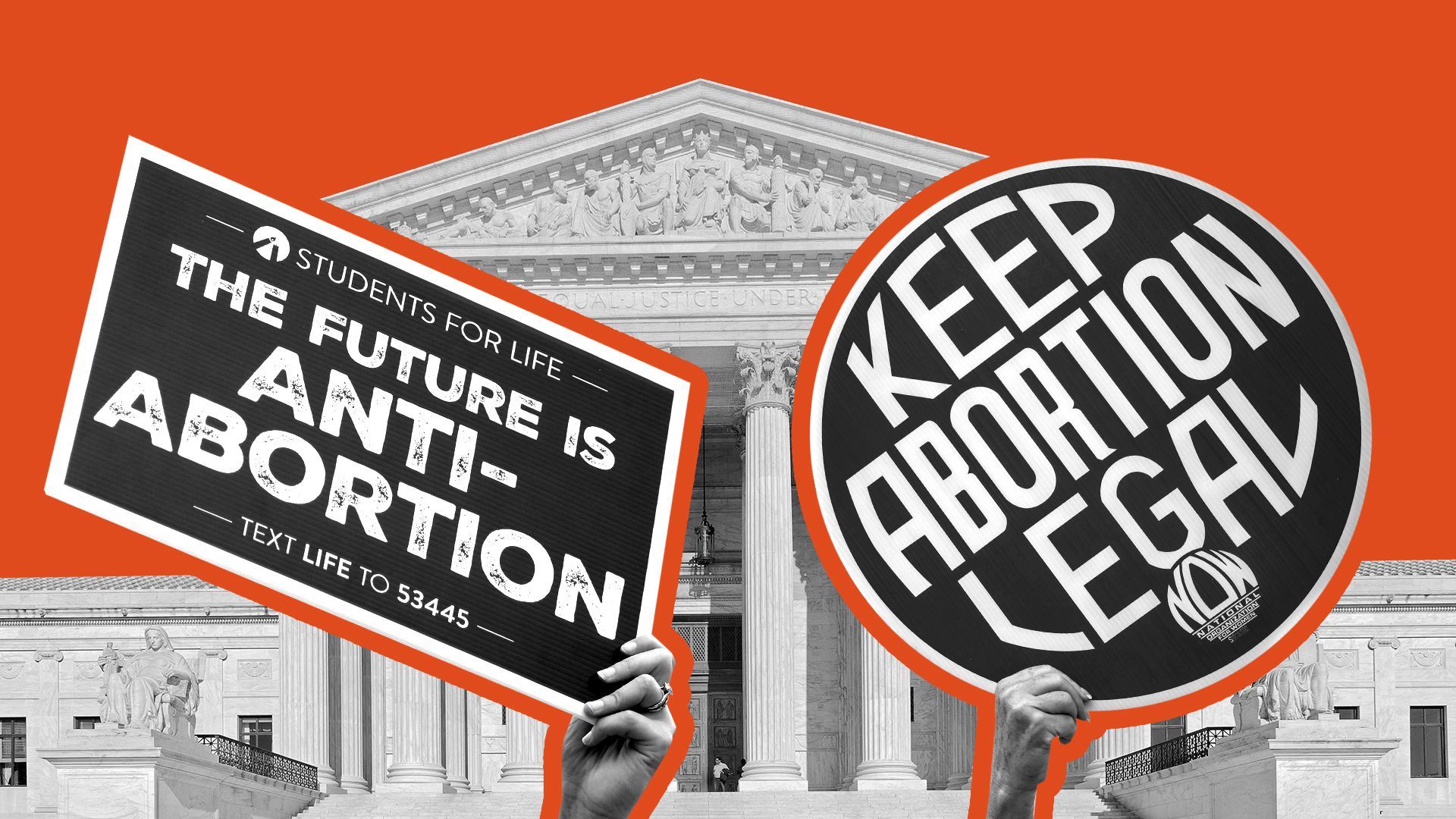Anti-abortion activists' Supreme Court dreams are coming true
Add Axios as your preferred source to
see more of our stories on Google.

Photo illustration: Annelise Capossela. Photos: Kevin Dietsch/Getty Images
This is the moment the conservative legal movement has been building toward for decades: The solidly conservative Supreme Court is about to hear two major abortion cases within a month of each other.
Why it matters: All of this is likely to end with significant new restrictions on abortion and a clear path for Republican-led states to win the next big abortion cases, too — the culmination of a long and bitter fight for control of the judiciary.
Driving the news: The court on Friday agreed to hear part of a challenge to Texas’ highly unusual abortion ban. Oral arguments will be Nov. 1 — a dramatically accelerated timeline that compresses into just a few days a process that normally takes months.
- One month later, on Dec. 1, the court is set to hear arguments in a separate case, challenging Mississippi’s ban on abortion after the 15th week of a pregnancy.
The big picture: Mississippi’s law and Texas’ law are structured quite differently, and the two cases raise different legal questions. But between them, they present the court with a whole lot of ways to rule in favor of tighter abortion restrictions.
- And with such a staunch conservative majority, the court seems virtually certain to take at least one of those options.
“This is the most significant moment in two generations,” said Mallory Quigley, a spokeswoman for the Susan B. Anthony List, an anti-abortion advocacy group.
That moment has arrived largely because conservative state legislatures kept passing new anti-abortion bills year after year, even when they were mostly being struck down in the courts, to keep the controversy alive — while Republicans in Washington maintained a laser focus, especially during the Trump administration, on taking control of the judiciary.
- “The court that we have now is the result of the long-game political strategy of the pro-life movement,” Quigley said.
Details: Roe v. Wade and subsequent Supreme Court precedents say that states cannot ban abortion before the point at which a fetus is considered “viable,” typically around 22 weeks. Mississippi, however, banned abortion after 15 weeks.
- The state has asked the court to uphold that ban, and also to go further and overturn Roe.
- Texas banned abortions after the detection of a fetal heartbeat, which typically happens at around six weeks — before some women even know they’re pregnant.
While Mississippi’s law is a straightforward government regulation, Texas allows any private citizen to sue any other private citizen who helps facilitate an abortion.
- Even many conservative legal experts believe the court will ultimately strike down Texas’ ban simply because of its vigilante enforcement structure. The Nov. 1 hearing will focus only on whether the Justice Department can challenge Texas’ law, not on the merits of that challenge or the merits of a six-week abortion ban.
Between the lines: The high court has twice refused to stop Texas’ law from taking effect while it works its way through the courts. The first time was a 5-4 decision, with Chief Justice John Roberts joining the court’s liberals.
- Roberts has voted to uphold states’ abortion restrictions in the past. He may well join a ruling in Mississippi’s favor. But the other conservative justices can win without him, if he’s not on their side — or even if he is, but wants to move more incrementally than they do.
What might now look like the mildest option on the table — upholding Mississippi’s 15-week ban, but declining to overturn Roe, and ruling against Texas — would be an enormous loss for abortion-rights advocates, because it would open the door for states to start proposing earlier and earlier bans, ultimately making them extremely hard to obtain in most GOP-led states.
